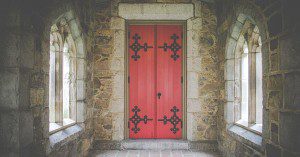Alleluia! He is Risen!
As many of you know, if you have happened to see any news all week, on Monday evening Notre Dame in Paris caught fire and the wooden interior of the church burned almost completely. A lot of movable art, relics, and other artifacts were carried out, and the rose window and iconic bell towers, and, indeed, the whole stone structure of the church, remain intact, but millions of dollars of valuable history is gone, poof, in a couple of hours.
When I found out I was angrily scrubbing my kitchen floor. My house was a disaster area and I was supposed to be studying for this sermon but I can’t think when my house is dirty. So I screamed at everyone and then started my scrubbing in a rage—adding sin to frustration and despair. But then my mother called me to turn on the news and so I stopped and slumped on the floor with my phone to watch the spire falling—falling over and over and over, as if civilization itself was dissolving in ash. Notre Dame is one of the places you should visit if you ever go on a historical tour of my life. I shuffled through its cool, vaulted nave as a child, when I couldn’t have cared less, and then as a young adult, finally marveling over the transcendent beauty, wishing I had a reason to settle down and live there.
Ezekiel was called to prophesy to Israel when everything they loved about themselves, and the place they lived, was not just under the threat of destruction—as all civilization is because of time, neglect, sin, foolishness, and just how everything eventually breaks and is ruined—but was actually destroyed before their very eyes. The way you stand by helplessly, watching the worst happen, unable to lift a finger to stop it, your throat filled with unutterable sorrow and rage. Jerusalem was torn down in front of them. The rich were marched away into captivity. The poor were left destitute with nothing. Their home was ravaged, a desolate wasteland. And it wasn’t just because of the malign evil of their enemies, the Babylonians. It was because God himself wanted them out.
Ezekiel has to dig a little hole through the wall of the temple to witness the sickening vision of the vile, idolatrous, desolations of sacrilege perpetrated by the elders of Israel in God’s own house. Later he sees another strange and terrible vision of the glory of the Lord leaving the temple, pushed out by the ugly ruin of sin, the place he promised to live. They would be his people, he had said, and He would be their God. They would live together, side by side, in peace and beauty.
That’s the glorious vision cast out in the very first two chapters of the whole Bible. God speaks and light floods the new, embryo cosmos. Then, for seven whole days, in some strange, primordial, mysterious lilting dance, God, by contrast and by harmony, brings about a most perfect balance and order, a gracious, abundant, capacious, beautiful home for us.
The vast sky and the water, the land and the sea, the day and the night, the sun and the moon, the fruitfulness of seeds growing into flowering, beautiful trees, the sea filled with life, the land adorned with every beautiful creature. And finally humankind—male and female—to live together and with God, working together for order and for beauty.
But of course in chapter three it is all spoiled. Adam and Eve reject God out of his own creation. And so they are cast out of their true and perfect home. And so Ezekiel, epochs later, laments, therefore, O mountains of Israel, hear the word of the Lord GOD: Thus says the Lord GOD to the mountains and the hills, the ravines and the valleys, the desolate wastes and the deserted cities, which have become a prey and derision to the rest of the nations all around…” The land itself suffers. The sins of the people mar the very ground.
Desolate wastelands should not take much for you to imagine. You know that old dead Kmart parking lot. Binghamton is well acquainted with the despair and decay a landscape has to endure at the hands of human innovation and sin.
But that’s not the worst of it. The wasted landscape is a proper visual representation of what lies at the heart of all of Adam and Eve’s children. The way we make ourselves comfortable and at home is often a very good reflection of the inside of the soul. Adam and Eve, reaching out to grab the fruit of autonomy and rebellion, sent away into the captivity of sin and death, went out of the beautiful garden fundamentally changed.
Adam, formed out of the earth, now doomed to return to the dust of the earth by death, has a stone for a heart. He is dead inside. All the works of his fleshy hand lead him to mar and ruin the land and himself. Even if he manages to build a cathedral, in the end it will come to nothing. He is a desolate wasteland.
And that’s where we are left on Friday evening as the Sabbath falls. Jesus dies on a rock, the place of the scull, and is laid, dead, in a tomb carved out of the stony hillside, a rock pushed over the only way out. Stones in the stomachs of all who watched him die, in an agony of helplessness, who go back to their homes—such as they are—to abide in grief for what will assuredly be the rest of their lives.
Except that God did not create us and this intricate, strange earth for it to end like this. When he came to dwell with the people of Israel there in the desert after the Exodus, that beautiful box sheltered in a tent, the smaller tents of all the people receding from its edge, it was for Order and and for Beauty, for his own nature and person to extend as a gracious and glorious light to the whole cosmos. Not for ruin and ugliness.
“It is not for your sake, O house of Israel,” quotes Ezekiel, two lines before, “that I am about to act, but for the sake of my holy name, which you have profaned among the nations to which you came.” And then he repeats it afterwards, “It is not for your sake that I will act.”
Did act, from our vantage point, as we are two millennia later, still facing the rubble of our lives. Did act—standing up in a body uncorrupted, un-ruined, remade to be whole and perfect and everlasting. The stone is pushed away, thrown down as if it weighed nothing, to reveal the remade, restored, beautiful, complete, whole second Adam—the one who didn’t push God out of his own creation, but being God himself, the very Word that brought creation into order in the first place, accomplishes the most perfect reconciling restoration of the cosmos. Trampling down death, walking coolly out of the tomb as the dawn sweeps over the vast sky, speaking once again to the first witnesses of his astonishing resurrected glory.
Did act to take the stone heart made dead by sin and fling it as far as the east is from the west, and in its place to put a true, beating, alive heart who thirsts for the true beauty of his abiding love, an alive heart who sees the true home of Christ himself.
Did act to put his own Spirit inside the one with that beating heart, a spirit that breathes life, that brings order, that sweeps out the ash and the dust the idolatry and desolation to make way for true goodness, true beauty, true joy, and even perfect peace. That Spirit makes a home in that alive, fleshy heart. Not as an unwelcome stranger, a malign enemy, but as a friend.
When we go out into the darkness of the night, we do not go as the dead, the heartless, the stone-cold, alone, alienated from each other and our creator to destroy ourselves and our home.
No, we go alive, the Resurrection of our Lord at the beating of the heart, the center of the self, binding us together into his home.
And we go for his sake, which is why he accomplished this great salvation, this great restoration of his cosmos and his creatures. We go because he made us and remade us to reflect his resurrected glory, to show the world what kind of God he is, how kind, how just, how perfect, how long-suffering, how loving, how alive. Though our bodies suffer the decay and ruin of Adam, the fleshy heart, the new Spirit-filled soul rejoices in the resurrected glory of Christ.












